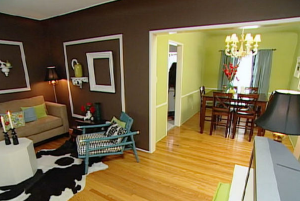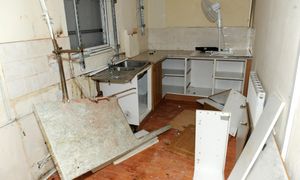Posted by Teresa on June 26, 2012 under Housing Trends | 
 When the economy is still sputtering and jobs are still hard to come by, average Americans are seeing their homes lose value and rents going up. But that happens to the super rich, too. In fact, the number of homes with rents that top six figures is rising. Demand is high and supply is short in the “trophy home” market, with tenants who are willing to pay each month what many of us would like to earn in a year.
When the economy is still sputtering and jobs are still hard to come by, average Americans are seeing their homes lose value and rents going up. But that happens to the super rich, too. In fact, the number of homes with rents that top six figures is rising. Demand is high and supply is short in the “trophy home” market, with tenants who are willing to pay each month what many of us would like to earn in a year.
For example, in Manhattan, the wealthy can rent an apartment where composer Cole Porter once lived. It has five bedrooms and five and a half baths, and rents for $150,000 per month. It’s located in the Waldorf Hotel, so tenants also get twice-a-day maid service. Another suite on the same floor rents for just $135,000—a savings of $15,000! per month
On the West Coast, several Beverly Hills homes fit into the $100K and over category. One boasts a disco and tennis court and goes for $195,000 per month. Beverly Hills is popular with actors and musicians who are in town for short periods of time and want luxurious mansions.
Brokers who work with the tenants who can afford these rentals say their clients are often celebrities like Beyoncé, foreigners, such as Saudi royalty, or entrepreneurs who need short-term housing. They want security and privacy, along with room for their staff of chefs, nannies, personal trainers and chauffeurs.
Other mega-rich tenants have a lot in common with an increasing number of “average” renters—they simply want flexibility in their housing. Rather than owning a home that may or may not sell when they’re ready to move, renting offers them the ability to move without hassle whenever they want—to a place like the Malibu beachfront home owned by actor Leonardo DiCaprio, with a $150,000 monthly rent.
No matter how rich your prospective tenant is, you need to protect your rental property and assets with tenant background checks. Proper tenant screening will ensure you are leasing to the best possible tenants.
Posted by Teresa on June 19, 2012 under Housing Trends, Landlord Tips | 
 What type of tenant are you trying to attract? Higher-end, luxury-loving people who demand the best? Outdoor types? Young families or professional singles? While the Fair Housing Act makes it illegal to discriminate against any group based on race, religion, family status and other factors, that doesn’t mean you can’t make your rental property stand out from the crowd so that your target market wants to live there.
What type of tenant are you trying to attract? Higher-end, luxury-loving people who demand the best? Outdoor types? Young families or professional singles? While the Fair Housing Act makes it illegal to discriminate against any group based on race, religion, family status and other factors, that doesn’t mean you can’t make your rental property stand out from the crowd so that your target market wants to live there.
For example, if your property is conducive to families with children, with playgrounds and three-bedroom units, you may not see as many single renters applying for leases. On the other hand, if you want to attract professionals (single or otherwise), you’ll want to provide amenities that they prefer, such as high-speed wireless Internet, online rent payment and maintenance requests, and flexible pet policies. They also may be looking for a little more character than a typical apartment offers. Features like hardwood floors, bright spaces, exposed brick and rafters, stylish appliances and modern lighting go a long way to attracting this crowd. Young professionals like to live in hip, cool—but not necessarily luxurious—spaces.
Obviously, if you want to attract a higher-end tenant, you’ll need to invest in luxury touches, such as marble in the bathrooms, quality fixtures, swimming pools, fireplaces, workout centers and beautiful landscaping. Give them plenty of room to park their cars, and storage for their skis, bikes, and other outdoor toys. Then respond to their requests for maintenance or other services as quickly as possible.
Think about whom you want to attract to your rental properties. Then think about what they want. Deliver it, and you could see vacancy rates dropping, and rents increasing.
Posted by Teresa on March 30, 2012 under Housing Trends, Landlord Tips, Lease and Rental Agreements | 
 It seems that smokers are having more and more trouble finding places to light up these days. They can’t smoke at work, or in most other public places, like bars and restaurants. Some municipalities are banning smoking in outdoor parks and other public places, too. Seems like his or her own home will soon be the only place a smoker can legally smoke. Unless they live in a no-smoking rental property.
It seems that smokers are having more and more trouble finding places to light up these days. They can’t smoke at work, or in most other public places, like bars and restaurants. Some municipalities are banning smoking in outdoor parks and other public places, too. Seems like his or her own home will soon be the only place a smoker can legally smoke. Unless they live in a no-smoking rental property.
Is that the case for your rental properties? Are your tenants allowed to smoke in their units, or in common areas? For an increasing number of landlords, the answer is “no.” It’s not so much the smokers’ health that landlords are concerned about—it’s the health of the rest of tenants, including children, who are subjected to second-hand smoke.
If you’re ready to ban smoking in your rental properties, you might experience some pushback from smoking tenants. Smoking is legal, after all. But landlords are within their rights to ban many legal activities, such as owning a pet, playing loud music or operating a business from home.
In many states, laws are changing to specifically state that landlords may adopt no-smoking policies. And some cities have instituted smoking bans on multiunit properties.
A new no-smoking policy generally requires 30 days’ notice before it can go into effect. A tenant with a current lease cannot be subjected to the ban until the lease expires and they sign a new one.
If you’re going smoke-free, think about how you’ll handle your policy. Will you include all units as well as common areas? Will smokers be allowed to smoke in a far corner of the property, or in an isolated area of the parking lot? How will you handle violators? If you own several buildings, would you convert some to smoking and the rest to non-smoking?
There are several ways to approach it, but encouraging tenants to give up smoking is good for everyone. After all, if you won’t subject a tenant to a neighbor’s noise, why would you want to subject him or her to a neighbor’s second-hand smoke?
Protect your rental property and assets through tenant background checks. Proper tenant screening will ensure you are leasing to the best possible tenants.
Posted by Teresa on February 25, 2012 under Housing Trends | 
 What happens when a bank takes over a rental property after foreclosure? In many cases, they are failing to live up to their legal duties. Tenants and regulators report banks that become landlords are not following local and state housing codes, and tenants often don’t know whom to contact to report problems.
What happens when a bank takes over a rental property after foreclosure? In many cases, they are failing to live up to their legal duties. Tenants and regulators report banks that become landlords are not following local and state housing codes, and tenants often don’t know whom to contact to report problems.
In Oakland, Calif., one tenant reported water leaks so bad that part of the ceiling fell in. Vandals broke windows. And with broken plumbing and exposed electrical wires, the bathroom is too dangerous to use, so he nailed the door shut. The previous owner was renovating the unit when he was foreclosed upon by the bank.
Even more shocking: the bank neglected to pay the water bill for the multi-unit building, so the utility company shut off everyone’s water. The tenant, a single dad with four kids, tried to pay his part, but was refused. With no water in his home, the tenant was compelled to steal one from a vacant home and reinstall it in his.
Another tenant in a bank-owned rental home in Maryland is living with an infestation of bedbugs. After the management company wouldn’t take care of the bedbugs and other problems, she and other tenants tried to find the landlord. They finally did, and were granted a meeting with the finance company who owned the building. Eventually, tenants were successful in getting some of their issues resolved. But the bedbugs remained untreated. Tenants were forced to sue.
Some banks do hire property managers to handle foreclosed properties. But with so many foreclosures being bought and sold, it’s difficult to track who is responsible for what. The problem is so widespread that the U.S. Treasure Department recently warned banks that thy must fulfill their legal duties as landlords.
This is just another example of how the face of housing is changing as a result of the housing bubble and subsequent collapse. States don’t know exactly how to enforce housing codes with banks. Some are drafting guidelines to deal with the problem. In the meantime, honest and professional landlords continue to provide safe housing for their tenants, while many tenants are powerless and living in squalor.
Protect your rental property and assets through tenant background checks. Proper tenant screening will ensure you are leasing to the best possible tenants.
Posted by Teresa on November 18, 2011 under Housing Trends, Rental Market | 
 Trulia is a real estate website where home buyers, renters, and sellers can track sales and rental activity in any city or neighborhood. The website recently launched a new report that reveals where renters and homebuyers live now, compared to where they want to live in the future.
Trulia is a real estate website where home buyers, renters, and sellers can track sales and rental activity in any city or neighborhood. The website recently launched a new report that reveals where renters and homebuyers live now, compared to where they want to live in the future.
The report tracked searches on the site between July 1 and September 30, 2011. The results may reveal where demand could be increasing ahead of actual sales and lease information. Trulia’s Chief Economist said that they believe the low prices in areas like Florida, Nevada and California will draw more prospective movers – who will be attracted to buying, rather than renting homes, as rental markets continue to tighten.
The company created an index for each metro area, based on the numbers of property views by people who live elsewhere. It also took into account the number of out-of-area property searches conducted by locals in each metro region.
The Top Ten High Demand Metro Areas For Homebuyers
1. Sarasota, FL: Foreclosure jumped 57% last quarter; home prices have fallen 51.4% since the peak and are expected to decline another 6.5% through Q2 2012. For every person in Sarasota looking for a home elsewhere, 6.03 people from out of the area are looking at Sarasota real estate.
2. Riverside, CA: High unemployment and poor economic conditions led to 55.4% drop in home prices from the peak and they are expected to decline another 14.8% through Q2 2012. For every person in Riverside looking for a home elsewhere, 4.36 people from out of the area are looking at Riverside real estate.
3. Charleston, SC: Real estate prices are down 23.3% since the peak and are expected to decline another 1.6% through Q2 2012. For every person in Charleston looking for a home elsewhere, 2.25 people from out of the area are looking at Charleston real estate. Retirement destination.
4. Fort Lauderdale, FL: Median home price went from $400K to under $200K in five years. Real estate prices are down 48.4% since the peak and are expected to decline another 9.2% through Q2 2012. For every person in Fort Lauderdale looking for a home elsewhere, 2.15 people from out of the area are looking at Fort Lauderdale real estate. Lots of retirees.
5. Cape Coral, FL: The market is bad here, but bargains exist. Real estate prices are down 59.3% since the peak and are expected to decline another 12.2% through Q2 2012. For every person in Cape Coral looking for a home elsewhere, 2.09 people from out of the area are looking at Cape Coral real estate.
6. West Palm Beach – Boca Raton, FL: One in four home sales in past year was a foreclosure. Real estate prices are down 50.2% since the peak and are expected to decline another 9.6% through Q2 2012. For every person in West Palm Beach looking for a home elsewhere, 1.99 people from out of the area are looking at West Palm Beach real estate.
7. Fort Worth – Arlington, TX: Home prices going up. Real estate prices are down just 5.9% since the peak and are expected to increase 2.7% through Q2 2012. For every person in Fort Worth looking for a home elsewhere, 1.97 people from out of the area are looking at Fort Worth real estate. Mostly from Dallas.
8. Oxnard, CA: Mecca for retirees. Real estate prices are down 40% since the peak and are expected to decline an additional 6% through Q2 2012. For every person in Oxnard looking for a home elsewhere, 1.92 people from out of the area are looking at Oxnard real estate.
9. Las Vegas: Two out of three homes underwater. Real estate prices are down 60% since the peak and are expected to decline an additional 11.4% through Q2 2012. For every person in Vegas looking for a home elsewhere, 1.88 people from out of the area are looking at Vegas real estate.
10. Orlando, FL: Hit hard by the housing crisis. Real estate prices are down 53.4% since the peak and are expected to decline an additional 11.4% through Q2 2012. For every person in Orlando looking for a home elsewhere, 1.87 people from out of the area are looking at Orlando real estate.
Posted by Teresa on October 11, 2011 under Housing Trends, Rental Market | 
 A new survey focusing on baby boomers and their home buying plans was released today by Coldwell Banker Real Estate. The survey of 1,300 agents and brokers finds that 87% of respondents have clients who already own or are looking to buy investment property. About 22% of agents responding said that at least half of their baby boomer clients fall into this category.
A new survey focusing on baby boomers and their home buying plans was released today by Coldwell Banker Real Estate. The survey of 1,300 agents and brokers finds that 87% of respondents have clients who already own or are looking to buy investment property. About 22% of agents responding said that at least half of their baby boomer clients fall into this category.
Jim Gillespie, CEO of Coldwell Banker Real Estate, said that baby boomers drive the U.S. economy; while they are a diverse group and cannot be generalized, their attitudes towards real estate can be telling. Right now, the economy is delaying boomers’ decisions to sell their existing homes, whether to downsize or relocate.
Coldwell Banker Real Estate’s data indicates that the boomers who can afford to are looking for a retirement home or a second home for investment, and many see now as the time to take advantage of lower home prices.
Additional survey findings:
- Younger baby boomers (ages 47 – 55) are more interested in purchasing a second home than older baby boomers (ages 56 – 64), by a margin of 34% to 22%.
- 31% of younger baby boomers are looking to sell an existing home and buy a larger home, compared to just 6% of the older group.
- Downsizing is more appealing to older (80%) than younger (52%) boomers. For the majority of older boomers, the reason for downsizing is not to save money, but to simplify their lives.
Interest rates are historically low, so younger baby boomers are actively seeking income streams for retirement. Perhaps they will be joining the ranks of the nation’s landlords, trading fixed annuities and bank CDs for property management guides and a set of handyman tools.
Posted by Teresa on September 13, 2011 under Housing Trends, Rental Market | 
 According to the U.S. Census Bureau, there has been a big jump from 2007 in the number of individuals and families doubling up in housing. The definition of “doubled-up” households are those that include at least one person over age 18 who is not in school, not the householder, and not a spouse or partner of the householder.
According to the U.S. Census Bureau, there has been a big jump from 2007 in the number of individuals and families doubling up in housing. The definition of “doubled-up” households are those that include at least one person over age 18 who is not in school, not the householder, and not a spouse or partner of the householder.
The Census Bureau says 69.2 million, or 30%, of adults were doubled-up in 2010, compared to 61.7 million adults, or 27.7% in 2007. Total American households who have doubled up due to unemployment or underemployment stands at 18.3%.
Much of the increase comes from people aged 25 – 34, living with their parents. That number increased from 4.7 million before the recession to 5.9 million (14.2% of the age group) in 2010.
The study was done as part of the Census Bureau’s wider report on income, poverty and health insurance. The report shows that household incomes dropped sharply last year. Since 2007, they have fallen 6.4%. Not surprisingly, the number of people living in poverty rose sharply, up for the fourth year in a row to 46.2 million people, or 15.1%.
If counted separately, some 45% of the young adults who live with their parents would fall below the poverty threshold. Because an entire household’s income is counted when determining poverty status, the group has an official poverty rate of only 8.4%.
What does the Census Bureau data mean for landlords?
- Fewer households mean lower demand for rental housing.
- Americans have less income to spend on housing and other necessities.
- Fewer home sales will continue to drag the housing market down.
- Once the economy starts to improve, many of the families and adult children will move out on their own, spurring a strong demand for housing.
Now, if only the economy would start to improve!
Posted by Teresa on August 17, 2011 under Housing Trends, Rental Market | 
 Real estate investors have long been active in college towns for a number of reasons. Rentals are often short-term and dealing with younger students as tenants can be problematic, but when mom and dad co-sign the lease, they tend to pay the rent on time every month.
Real estate investors have long been active in college towns for a number of reasons. Rentals are often short-term and dealing with younger students as tenants can be problematic, but when mom and dad co-sign the lease, they tend to pay the rent on time every month.
College enrollments are up, and on-campus housing is in short supply. Demand for rentals is high and vacancies low, so rents are generally healthy. All told, college students who need a place to live can be excellent prospective tenants—and rental property in a college town can be a great opportunity, if the terms and price are right for you.
Move.com recently published a list of the best university cities for real estate investment. Here’s how their ratings shook out:
| City |
Median List Price |
Average Rent, 2BR |
Average Rent, 3+BR |
| Boston |
$335,000 |
$3,122 |
$3,913 |
| Nashville |
$189,000 |
$949 |
$1,020 |
| Chicago |
$199,900 |
$1,780 |
$2,074 |
| Washington DC |
$375,000 |
$3,086 |
$3,214 |
| Houston |
$174,900 |
$1,218 |
$1,478 |
| South Bend, IN |
$112,900 |
$790 |
$880 |
| Atlanta |
$159,600 |
$1,236 |
$1,485 |
| Baltimore |
$242,700 |
$1,443 |
$1,663 |
| St. Louis, MO |
$163,945 |
$1,016 |
$1,283 |
| Syracuse, NY |
$154,900 |
$838 |
$970 |
- Boston has over 50 colleges and list prices have dropped nearly 3% since last June. Rents are on the rise.
- Nashville’s average rents are higher than the average mortgage of $770.
- Chicago’s median list price is down over 16% since last June.
- Washington DC’s average mortgage for a median-priced home is around $1,530.
- Houston has low-priced inventory and some top-ranked colleges. Average mortgage is about $710.
- South Bend is home to Notre Dame and the average mortgage payment is around $990.
- Atlanta’s median list price is down 13.68% from last June, and lower than the national median.
- Baltimore is home to Johns Hopkins University, with median prices down 7.72% since last year.
- St. Louis, MO ‘s median list price is also lower than the national average, and mortgage payments average around $670.
- Syracuse is home to Syracuse University, as well as several other colleges. Median prices are down and the average mortgage payment is around $630.
College towns have a ready-made pool of renters, and generally, the rent money is not a problem. Manage the property correctly, and you could have a successful investment for years to come.
Posted by Teresa on February 22, 2011 under Housing Trends | 
 The Obama administration recently revealed its proposal to reduce Fannie Mae (FNMA) and Freddie Mac (FMCC), the mortgage giants that have enabled homeownership for millions of Americans. The report offered three options for replacing the two agencies.
The Obama administration recently revealed its proposal to reduce Fannie Mae (FNMA) and Freddie Mac (FMCC), the mortgage giants that have enabled homeownership for millions of Americans. The report offered three options for replacing the two agencies.
It also makes it clear that rental housing will remain a priority as more renters enter the market in coming years. In the white paper, the government recognizes Americans are giving up homeownership in favor of renting. With a record 37 million rental households and a possible 4.4 million additional by 2015, it’s not something that can be ignored—and the administration is not.
“Americans should have choices in housing that make sense for them and their families. This means rental options near good schools and good jobs,” the report states. It further indicates that finding ways to maintaining funding to the rental market will be “critical.”
One proposed action is expanding the Federal Housing Administration’s support to the multifamily industry, including developing programs to serve hard-to-reach segments, including the smaller properties that comprise one-third of all rental apartments. The report noted that half of renters spend more than one-third of their income on housing, while a quarter spend more than half; a commitment to affordable rental housing is indicated, although the term is not defined.
The National Multi Housing Council, a trade group, responded that reform is needed in the single-family sector, that Fannie and Freddie’s multifamily programs were not part of the financial meltdown and that “they are a vital capital source for the rental housing sector.”
Posted by Teresa on February 9, 2011 under Housing Trends | 
 Arizona state lawmakers have approved to send to the full state Senate a new law requiring landlords and tenants to share responsibility for bedbugs in rental units. Here’s how the proposed law shakes out:
Arizona state lawmakers have approved to send to the full state Senate a new law requiring landlords and tenants to share responsibility for bedbugs in rental units. Here’s how the proposed law shakes out:
Rental property owners will be required to:
- Keep their units free of bedbugs.
- Provide tenants a copy of the law, once passed, as well as with educational materials on bedbugs, including prevention and control measures.
- Arrange for a licensed pest control company to inspect a unit within seven business days of a possible bedbug problem.
- Start the process of mitigating the bedbugs in the rental unit within seven days of finding evidence of infestation.
Tenants are responsible for:
- Notifying landlords in writing or via electronic document of infestations.
- Providing access to their units for inspection and bedbug treatment.
- Complying with the bedbug mitigation protocol established by the pest control company is required. This includes pre- and post-treatment procedures, temporary evacuation of the unit and notifying within three days of recurrence.
Additional Requirements:
- Landlords are prohibited from knowingly leasing a bedbug-infested rental unit.
- Tenants are prohibited from moving bedbug infested materials into a rental unit.
- Only licensed pest control applicators would be allowed to treat bedbugs in multifamily housing.
- Tenants must receive written notification of mitigation treatment three business days or more before it begins.
Perhaps most important is the allocation of financial responsibility. According to the bill, while the landlord is responsible for pest control expenses when tenants comply with their obligations, the responsibility falls to a tenant if they fail to comply. In this case, not only are tenants responsible for mitigating the problem in their own unit, but also any surrounding units that become infested due to non-compliance.
This bill is one of the first we’ve seen that tackles the bedbug problem in rental units. And, it seems to be pretty fair to landlords. What do you think?
We’ll follow the bill as it progresses through the Arizona state Senate.
 When the economy is still sputtering and jobs are still hard to come by, average Americans are seeing their homes lose value and rents going up. But that happens to the super rich, too. In fact, the number of homes with rents that top six figures is rising. Demand is high and supply is short in the “trophy home” market, with tenants who are willing to pay each month what many of us would like to earn in a year.
When the economy is still sputtering and jobs are still hard to come by, average Americans are seeing their homes lose value and rents going up. But that happens to the super rich, too. In fact, the number of homes with rents that top six figures is rising. Demand is high and supply is short in the “trophy home” market, with tenants who are willing to pay each month what many of us would like to earn in a year.








